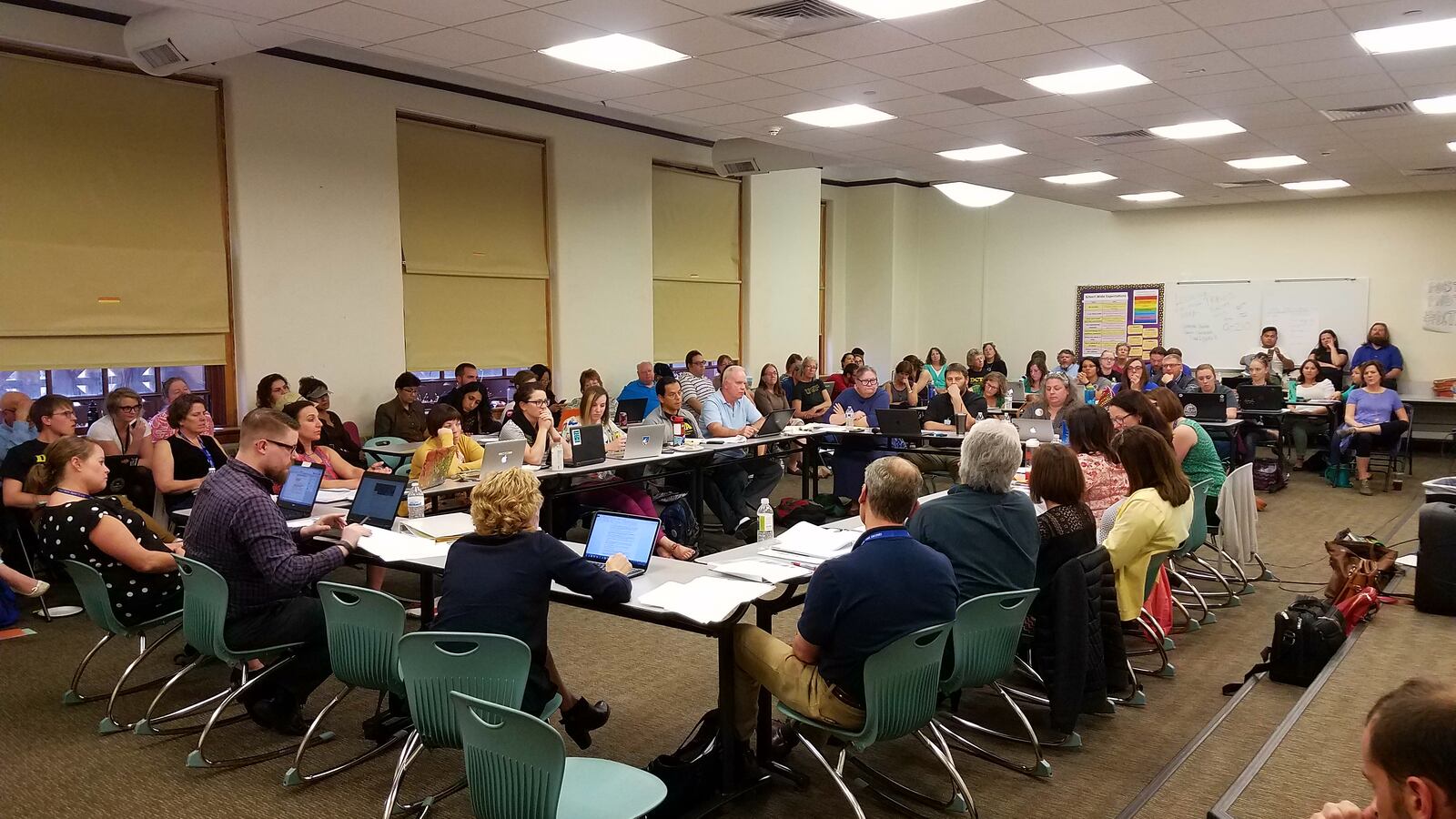Their school days concluded, about 35 Denver educators gathered in a high school auditorium earlier this month to hear starkly different visions of what a teachers union should be.
On one side of a table up front, three veteran union leaders painted a picture of steady progress in better engaging members, challenging Denver Public Schools in court and turning out large numbers for the latest round of contract bargaining.
Sitting to their right, three younger teachers gunning for those union leadership positions portrayed the status quo as ineffective in battling a “corporatist” district agenda and in addressing broader social justice issues harming students and communities.
Which vision prevails will be known Friday, when results are expected to be announced in an unusually competitive and testy Denver Classroom Teachers Association election. Seven members of a newly formed caucus within the union — including the three who took part in this month’s debate — are running as a slate to challenge incumbents for every eligible seat.
The outcome will provide a sense of how rank-and-file teachers view the state of their union, which has had little impact slowing Denver Public Schools’ nationally known reforms. It’s also the latest test of a growing movement across the country pushing unions, many of which are suffering declining or flat membership, to drape themselves in progressive social justice causes.
“The caucus is not trying to divide our union,” said Tommie Shimrock, a middle school teacher who is challenging eight-year incumbent Henry Roman for union president. “The caucus is designed to push a viewpoint that members do not feel is being elevated.”
Both Roman and Lynne Valencia-Hernández, the union vice president, refused interview requests for this story. Both said they were too busy with contract negotiations and other responsibilities.
Roman has previously said members of the new caucus — called the Caucus of Today’s Teachers — are “entitled to their opinions and that’s all good.”
At the March 1 debate, Roman noted that membership challenges are not unique to the Denver teachers union. He said the Colorado Education Association, the state’s largest union, is “facing tough times.” A spokesman for the association said it has more than 35,000 members, but he declined to provide information about membership trends.
The Denver Classroom Teachers Association has about 2,940 members, or about half the teachers in DPS, officials say.
Shimrock portrayed the Denver union’s current leadership as complicit in an era that has seen erosion of teachers’ rights and rapid growth of charter schools and innovation schools. Innovation schools are managed by the district but don’t need to follow the union contract.
Shimrock also criticized the union for failing in efforts to elect candidates to the school board who favor union positions. With four of the seven Denver school board seats up for grabs this November, a high-stakes, big-money election is anticipated.
Roman said at the debate that the union is “absolutely moving in the right direction.” Large numbers have attended a handful of contract bargaining sessions, including a boisterous Monday night meeting about teacher evaluations that drew Superintendent Tom Boasberg and his deputy, Susana Cordova.
Both the current regime and the challengers agree that the district’s teacher evaluation and pay-for-performance systems have not served teachers well. But they disagree on what to do next, with the new caucus arguing it’s time to scrap both and start over.
Roman said that when discussing the pay-for-performance system, known as ProComp, the union has to be realistic.
“As an organization, we cannot deal in absolutes,” Roman said. He added that organizations can have “no permanent friends and no permanent enemies.”
The current union leadership is already claiming some victories in bargaining, including giving every member access to an HMO as part of the health care plan. So far, however, the union has not made headway in trying to change contract language about evaluations.
The upstart caucus in Denver is drawing inspiration and ideas from the Chicago union, where a similarly-minded group wrestled away leadership seats and went on to lead a strike in 2012.
One of the Denver slate members, high school math teacher Marguerite Finnegan, traveled to Chicago last spring to march with union members in a one-day strike meant to pressure state lawmakers to break a budget stalemate threatening Chicago’s schools.
Finnegan said in an email the caucus wants the union to become one that “stands up for justice rather than simply being malpractice insurance for teachers.” That, caucus member say, means teaming up with other organizations to work on issues ranging from poverty to better pay for janitors.
“We want to partner with the community and with parents for the good of our students, because we are natural allies,” Finnegan said. “Our working conditions are the students’ learning conditions, and our students deserve the best.”

